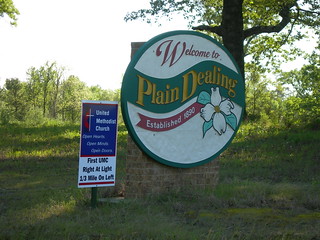After settling in, the Gilmers began to develop the Plain Dealing Plantation. It was named after the plantation that they owned in Virginia. Of course, that's also where the small town got its name. Plain Dealing is also a title that is interpreted as it is written. That the family was honest and had integrity. Which also applies to the town today. Though names don't always represent the truth.
Years passed and Mary Boutwell Gilmer Vance, who was the daughter of James Gilmer, lived in George Gilmer's old home with her husband, Dr. Samuel Whitfield Vance. Mary died in the year 1859 at age 23 and he died on May 18, 1877, at age 50. After Samuel's death their daughter, Sallie Vance, inherited the Plain Dealing Plantation. The George Gilmer home burned down in a fire in 1888.
Sallie Vance had married S.J. Zeigler in 1877. Though he was known to the family earlier on after he came to Bossier Parish around the year 1870. He was a businessman, and first vice-president of the St. Louis Southwestern Railway, and was working on planning the railroad route that would head to Shreveport. So he chose Plain Dealing to serve the railroad as a stop on the way to Shreveport.
The town began to develop and one of the earliest business, a store, was owned by S.J. Zeigler. The store was at the site of the present-day Walker Brothers Drug Store. As interest in the town began to increase, there was an auction held and Mr. Zeigler arranged for trains to be brought in. These trains carried those who were looking to purchase auctioned lots. A total of 348 lots were sold for a combined sum of $11,414.50.
Prior to the town being named Plain Dealing, it was briefly known as Guernshein after the name of a major stockholder of the railroad company. The town of Plain Dealing became official on April 24, 1890. At the time, the town had less than 100 residents. William Benton Boggs became the town's first mayor after he took office on April 5th, 1890. He would also later become an organizer and president of Plain Dealing first bank and a state senator.
In 1891, Mr. Zeigler donated land for the formation of the Plain Dealing Cemetery. Some of the Gilmer, Vance, and Zeigler families are buried in the cemetery.
The town's first newspaper, The Plain Dealing Progress, began printing in December 1929 under Felix Glynn Phillips. From 1926 to 1849, he was also the principal of Plain Dealing High School. He also helped create the Dogwood Festival, which attracted visitors all over Ark-La-Tex in celebration of the spring blossoms of the Dogwood trees on the North Bossier hills. Although the official festival was ended in 2003, residents still hold their own festival.
Today, Plain Dealing is still a small town with a good sense of its culture and is known for its past notable residents.



